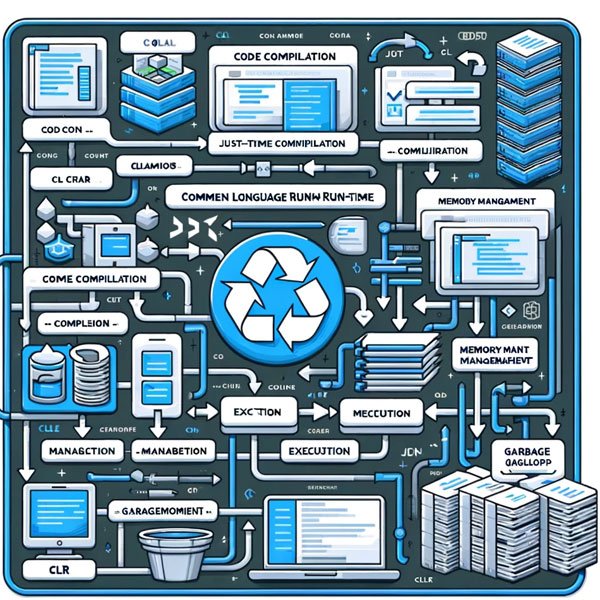Introduction
When interviewing for a .NET developer position, one fundamental question you can expect is: “Can you explain the .NET framework and its key components?” This question tests your foundational understanding of the .NET ecosystem, crucial for any role involving .NET development. In this blog post, we’ll delve into the .NET framework, exploring its key components and their significance.
What is the .NET Framework?
The .NET Framework is a software development platform developed by Microsoft. It’s a powerful framework used to build and run software applications for Windows, Windows Server, Microsoft Azure, and XML Web services. It provides a controlled environment for software development and execution, including a virtual execution system and a unified set of class libraries.

Key Features
- Language Interoperability: .NET supports multiple programming languages, allowing developers to choose the one they are most comfortable with.
- Base Class Library (BCL): Offers a set of standard classes that any .NET program can call.
- Common Language Runtime (CLR): Manages program execution, including memory management, thread management, and security.
Key Components of .NET Framework
- Common Language Runtime (CLR):
- Acts as the execution engine of the .NET Framework.
- Manages memory, thread execution, code safety verification, compilation, and other system services.
- Framework Class Library (FCL):
- A comprehensive collection of reusable classes, interfaces, and value types.
- Provides extensive functionality ranging from file reading to XML parsing to UI development.
- ASP.NET:
- A robust platform for developing dynamic web applications and services.
- Offers features like web forms, MVC, and web API for diverse web development needs.
- Windows Presentation Foundation (WPF):
- Provides a rich set of libraries for building desktop applications with sophisticated UI features.
- Supports advanced graphics, layout, and data binding.
- Windows Communication Foundation (WCF):
- Framework for building service-oriented applications.
- Enables communication across different platforms and programming languages.
- Language Integrated Query (LINQ):
- Introduces standard, easily-learnable patterns for querying and updating data.
- Can be used with various data sources like SQL databases, XML documents, and more.
- Entity Framework:
- An ORM (Object Relational Mapping) framework for .NET.
- Allows developers to work with data in the form of domain-specific objects, eliminating most of the code for data access.
- ADO.NET:
- Core for data access in the .NET Framework.
- Provides a rich set of components for controlling data and data services.

Why is .NET Framework Important?
- Versatility: Suitable for building a wide range of applications, from web to desktop to mobile.
- Security: Robust security features like code access security and role-based security.
- Efficiency and Productivity: High level of abstraction, comprehensive libraries, and interoperability reduce development time and costs.
Suitable Answers in an Interview
- Explain the structure and components of the .NET Framework.
- Discuss the features and capabilities of each component.
- Relate components to real-world applications or experiences.
Code Example: A Simple .NET Console Application
using System;
namespace DotNetBasics
{
class Program
{
static void Main(string[] args)
{
Console.WriteLine("Hello, .NET Framework!");
}
}
}Wrapping Things Up
The .NET Framework is a fundamental aspect of .NET development, and understanding its key components is crucial for any aspiring .NET developer. This comprehensive overview provides the foundational knowledge needed to confidently answer interview questions related to the .NET Framework.
